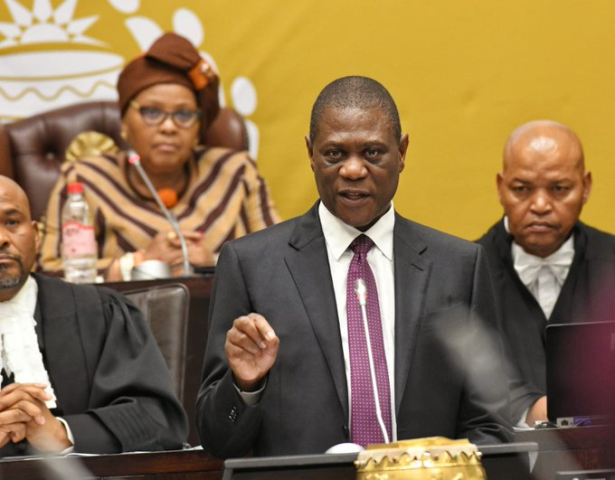Mashatile Launches Transformation Fund to Boost Inclusive SA Economic Growth
The announcement came during a high-level Business Breakfast Session, where key government officials and private sector representatives convened to mark this transformative initiative.

- Country:
- South Africa
In a rousing keynote address delivered at the Freedom Park Heritage Site and Museum in Pretoria, South Africa's Deputy President Paul Mashatile heralded the launch of the Transformation Fund as a decisive milestone in the nation’s pursuit of inclusive economic transformation. The announcement came during a high-level Business Breakfast Session, where key government officials and private sector representatives convened to mark this transformative initiative.
“Today is an important and historic day for South Africa,” said the Deputy President. “The launch of the Transformation Fund represents a key milestone in our journey towards building an inclusive economy. It will serve as a strategic vehicle for businesses to embrace change, foster innovation, and accelerate growth.”
A Strategic Collaboration Between Public and Private Sectors
The Transformation Fund is designed as a collaborative initiative between the government and private sector, intended to unlock opportunities through Enterprise and Supplier Development (ESD) and the Equity Equivalent Investment Programme (EEIP). It specifically aims to facilitate economic inclusion for historically disadvantaged communities, especially Black-owned enterprises in rural and township areas.
Deputy President Mashatile praised the co-funding model, noting, “It is commendable that the fund is anchored by both private and public sector contributions, fulfilling obligations under ESD and EEIP. This alignment reflects a shared vision for economic justice and sustainable growth.”
The fund’s administration will be centralized and conducted in partnership with the business community to enhance accessibility and accountability, with an emphasis on ensuring that the majority of funding benefits black-owned businesses operating in under-resourced areas.
Empowering SMMEs Across Key Economic Sectors
Funding from the Transformation Fund will be channeled into various productive sectors of the economy, including agriculture, tourism, and services. This support will go beyond financial assistance to include technical guidance and market access, thereby equipping enterprises with the tools necessary for long-term sustainability.
“Through this Fund, we aim to cultivate resilience in our enterprises,” said Mashatile. “It is not just about growth—it is about establishing a foundation for businesses to adapt and lead in changing environments.”
Placing the Transformation Fund at the Heart of Government Policy
Deputy President Mashatile underscored that the Transformation Fund will not be a side initiative but will instead take a central role in the national economic strategy. He committed to ensuring that the Fund is situated at the heart of government, specifically within the Presidency. “We will collaborate closely with the Minister of Trade, Industry and Competition, Mr. Parks Tau, and other key ministers in the Economic Cluster to ensure that objectives are met, especially regarding procurement targets,” he added.
He also confirmed that National Treasury, in partnership with the Department of Women, Youth, and Persons with Disabilities, has already worked on a framework to support implementation. The next critical phase, he noted, is focused on execution and aligning the Fund’s efforts with the Preferential Procurement Policy Framework Act.
Tackling Corruption as a Prerequisite for Economic Inclusion
Deputy President Mashatile was unequivocal in his stance against corruption, identifying it as one of the major impediments to economic inclusion. “Corruption increases the cost of doing business, erodes trust, and undermines the very foundations of economic transformation,” he warned.
To address this, the Deputy President called for the development of robust anti-corruption frameworks, a stronger criminal justice system, and increased citizen oversight. “Fighting corruption is not optional—it is a necessity if we are to build an inclusive and sustainable economy,” he stated.
Unlocking Access to Finance for Black Entrepreneurs
A major focus of the Transformation Fund will be addressing the critical issue of access to finance for Black-owned businesses, particularly small, micro, and medium-sized enterprises (SMMEs). Despite government initiatives like ESD under the B-BBEE framework, Mashatile acknowledged that systemic barriers persist, particularly in the form of restrictive lending criteria.
“Loans remain the most commonly used financial instruments for small businesses, but stringent underwriting standards often exclude those who lack collateral or formal financial histories,” he explained. “We therefore urge small businesses to explore alternative funding avenues provided by agencies such as the National Empowerment Fund (NEF), the Small Enterprise Finance Agency (SEFA), and the Small Enterprise Development Agency (SEDA).”
Looking Ahead: A Vision for Inclusive and Sustainable Growth
As South Africa grapples with socioeconomic inequality, unemployment, and the lingering effects of historical injustices, the Transformation Fund signals a deliberate shift toward inclusion, empowerment, and systemic change. Deputy President Mashatile concluded his remarks with a call for unified commitment to transformation.
“Investing in the Transformation Fund is not just a financial decision—it is a moral one,” he said. “It is a declaration of our collective intent to reshape the future of South Africa, where opportunity is not dictated by race or geography, but by talent, innovation, and ambition.”
With implementation frameworks taking shape and multisectoral collaboration underway, the Transformation Fund is poised to become a powerful instrument for bridging the economic divide and building a more equitable and prosperous South Africa.
Tags:










